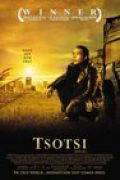
Directed by
Gavin Hood
94 minutes
Rated M
Reviewed by
Andrea Buck

Tsotsi
Synopsis: A nameless AIDS orphan (Presley Cheneyagae), known simply as “Tsotsi” ("young thug" in the local street lingo) is the product of a sprawling Johannesburg shantytown in the New South Africa. After his violent attack on his friend, Tsotsi is ostracised even from his own and takes off into the night and, on a whim, carjacks a woman outside her high-security mansion, shooting her and, unknowingly, drives off with her baby strapped in the back. Tsotsi decides to keep the child and show it the love and care he never received – not that he has any idea how to do so.Tsotsi was adapted from Athol Fugart’s novel set in the 1950’s, now re-located in a contemporary and hence post-apartheid setting. Though this choice was for the most part about financial expediency it is what makes the film worthwhile, having created a social portrait that, by keeping focus on its characters paints an accurate picture of the harsh realities of life for the majority in South Africa today. It shows black on black violence in the shantytown of a 10 million strong city pulsating with cross-cultural energy. Rich, powerful blacks fall victim to angry, violent blacks with no education and no hope; the cop may be white but is no longer omnipotent. The social, socio-political and socio-economic complexities that characterize the country are brought home but without cliché or didacticism.
Thankfully the director (Gavin Hood) and producer (Peter Fudakowski) cast local actors speaking local “Tsotsi-taal”, (the language of the streets of Soweto), giving the film its essential authenticity. For the most part they offer intense, moving performances, but, whether it is the inexperience of the cast, or, more likely, the direction, the film at times feels staged and the acting a little stilted, particularly when more intimate scenes attempt to dramatise the emotional progression of Tsotsi. As his friends, Boston (Mothusi Magano), Butcher (ZenzoNgqobe) and especially Aap (Kenneth Nkosi) are more adept at subtle character portrayal, offering a treat of genuine tenderness and humour and, apart from some uncomfortable scenes with Tsotsi, Miriam (Terry Pheto) gives a beautiful, tender insight into the power of the mother amid the chaos of squalor.
This film has been likened to City Of God (2002), with reason, although it is not quite of the same calibre, lacking a tad in equivalent pace and overall punch. The photography, though beautiful, is at times overdone. Simply capturing the amazing visual reality of the shantytowns would be enough and I found the brown filters, aimed to enhance, instead detached us from its reality. The soundtrack, on the other hand – especially the pumping Kwaito music (a home-grown style of popular dance music rooted in Johannesburg township culture) – feels vibrant and authentically street-wise.
Babies in films are always tough, especially as pivotal characters. This film manages wonders with its littlest cast member, making one wonder at times whether the filmmakers had as stringent legal requirements regarding children to deal with as we do. The scene of Tsotsi pulling the screaming child from its ‘cot’- a shopping bag kept under the bed, to find it crawling with ants is as intensely emotive as it is shocking. Other times feel less realistic: such a young baby would require more constant attention, incessant feeding and allow almost no room for any other story to be told.
Tsotsi is a brave, powerful film that, despite its lapses is well worth watching, and certainly worth listening to.

Want more about this film?


Want something different?




